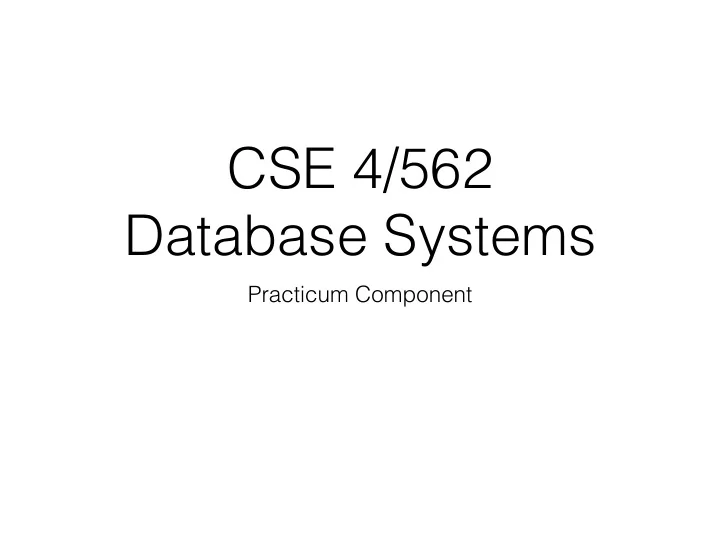

CSE 4/562 Database Systems Practicum Component
Project Outline Parser & SQL Query Relational Algebra Translator A relational query processor Optimizer Statistics Query Evaluation Execution Plan Result Engine
Project Outline Parser & SQL Query Relational Algebra Translator Checkpoint 3 Optimization Optimizer Statistics Query Evaluation Execution Plan Result Engine
Checkpoint 3 How do make your system faster? • Programming efficiency? • Choosing a strategy? • More efficient operators? • How can you deal with aggregation? •
Checkpoint 3 • 3 Main Components • New functions (Distinct, Group-By, and functions) • Optimization (Projection/Selection Pushdown) • Join Algorithms
New Functions • GROUP BY – HAVING • COUNT() • AVG() • SUM() • MIN() – MAX() • DISTINCT
Aggregations • Hash aggregation algorithm • Requires more memory • Stream aggregation algorithm • Requires data to be sorted first
Hash Aggregation for each input row begin calculate hash value on group by column(s) check for a matching row in the hash table if we find a match update the matching row with the input row else insert a new row into the hash table end output all rows in the hash table
Stream Aggregation For each input row begin if the input row does not match the current columns begin output the aggregate results clear the current aggregate results set the current group-by columns to the input row end update the aggregate results with the input row end
Optimization • You already implemented Selection pushdown • You need to implement Projection pushdown
Selection Pushdown • Helps you filter out unnecessary tuples early on • Provides both memory and CPU time profits • Saves you memory because join and cross product algorithms use memory based on their input size • Saves you CPU time because other operators do not need to deal with unnecessary tuples
Projection Pushdown • Helps you filter out unnecessary attributes early on • Provides both memory and CPU time profits • Saves memory because you don’t carry unnecessary data between operators • Saves CPU time because you don’t copy unnecessary data when you modify the tuple schema and need to copy data to the new tuple
Join Algorithms • Nested-Loop-Join and Block-Nested-Loop-Join are slow… • Try other join algorithms
Classic Hash Join Works when the smaller relation R fits in memory. Build a in-memory hash table for the smaller 1. relation; For each record in the larger relation, probe the 2. hash table. If the smaller relation does not fit in memory, partition into smaller buckets!
Simple Hash Join 1. for each logical bucket j for each record r in R 2. if r is in bucket j then 3. insert r into the hash table; 4. for each record s in S 5. if s is in bucket j then 6. probe the hash table; 7. • Classic hash join is a special case, with one bucket; • Optimization: write the tuples not in bucket j to disk; • Works good when memory is large (nearly as large as | R |).
GRACE Hash Join partition R into n buckets so that each bucket fits 1. in memory; partition S into n buckets; 2. for each bucket j do 3. for each record r in Rj do 4. insert into a hash table; 5. for each record s in Sj do 6. probe the hash table. 7. • Works good when memory is small.
Hybrid Hash Join • Hybrid of simple hash join and GRACE; • When partitioning R , keep the records of the first bucket in memory as a hash table; Typically this means that the first bucket uses more pages in • memory (all other partitions are 1 page each) • When partitioning S , for records of the first bucket, probe the hash table directly; • Saving: no need to write R 1 and S 1 to disk or read back to memory. • Works good for large and small memory.
Handle Partition Overflow • Case 1, overflow on disk: an R partition is larger than memory size (note: don’t care about the size of S partitions). • Solution (a) small partitions first and combine before join; • Solution (b) recursive partition. • Case 2, overflow in memory: the in-memory hash table of R becomes too large. • Solution: revise the partitioning scheme and keep a smaller partition in memory.
Questions?
Recommend
More recommend